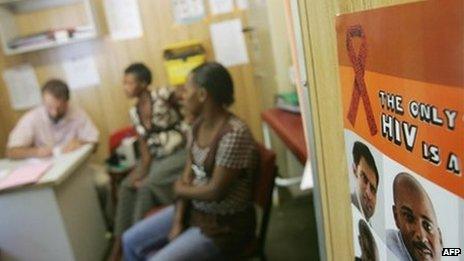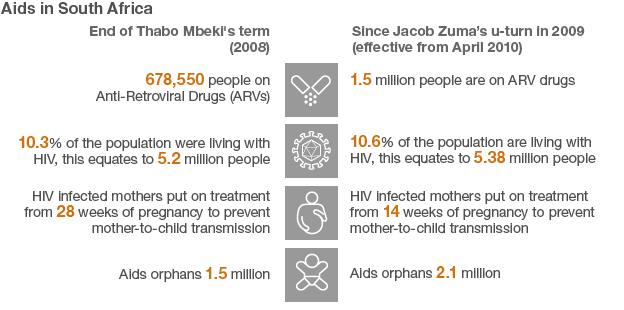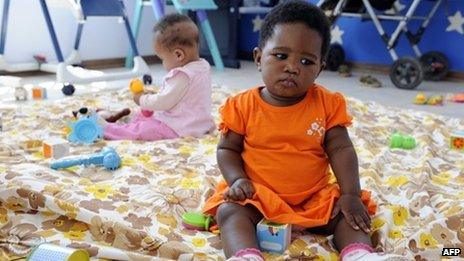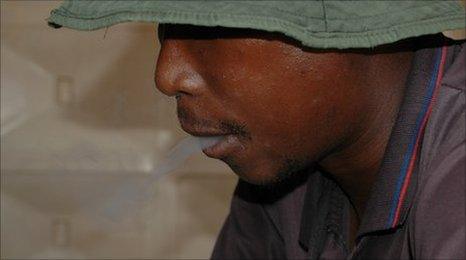Is South Africa's Aids plan working?
- Published

Aids still accounts for almost half of all deaths in South Africa
South Africa has one of the world's highest HIV rates but for many years was accused of ignoring the problem. Two years ago, President Jacob Zuma introduced some radical changes to the country's Aids policy. To marks World Aids Day, the BBC's Pumza Fihlani in Johannesburg asks what has changed.
Moses Sechedi lives in Soweto, one of South Africa's biggest townships.
Outside the Chris Hani Baragwanath Hospital - the largest hospital in Africa - Mr Sechedi, 62, tells me that he has seen the benefits of the new policy.
"A few months ago, my younger sister became gravely ill and we rushed her to hospital. After a number of tests the doctor told us she had Aids," he says.
The family was devastated.
His 39-year-old sister suffers from mental illness and had been raped when she was younger by a local traditional healer who had promised the family he could cure her.
The healer recently died of Aids-related complications but Mr Sechedi's family had not thought to have her tested until she became sick.
Mr Sechedi says his sister would have died were it not for the Aids drugs she receives.
"Those pills are the reason she is alive today. She is getting stronger by the day - it is like looking at a miracle daily," he says.
'Doing the right thing'
Under President Zuma's new policy, the number of HIV-positive people like Mr Sechedi's sister receiving live-saving anti-retroviral (ARV) drugs has more than doubled from 678,500 to 1.5 million.
The government of former President Thabo Mbeki, who denied the link between HIV and Aids, said it could not afford to roll out this treatment to all the South Africans who needed it.

More than five million people are HIV-positive - about 10% of the total population.
Health Minister Aaron Motsoaledi told the BBC that his department plans to provide Aids drugs to the remaining one million patients who need them by 2014.
Not everyone who is HIV-positive needs the drugs.
The most common way of checking is to measure the CD4 cells, which help the body to fight diseases.
Under the previous administration, only those with a CD4 count of 200 were given treatment - by which time they were already sick - but this has now been raised to 350, meaning the drugs are provided in time to keep people healthy and active.
The Treatment Action Campaign (TAC) led a vigorous campaign against Mr Mbeki's government - even taking the authorities to court to secure the right to ARVs.
It says the government is "finally doing the right thing".
"We have moved from an era of denialism to realism," the group's Marcus Low says.
It seems there is now the "political will to fight the disease", he says.
The government has also added medical male circumcision to its Aids plans. State health facilities now provide free circumcisions, which health officials say reduces the risk of transmission by 60%.
Experts also say new infections have decreased over the past couple of years, which could indicate that young people are changing their sexual behaviour.
Saving the children
Another key plank of the government's new Aids policy is to prevent mother-to-child transmission (PMTCT).

There are more than two million Aids orphans in South Africa
Until 2009, pregnant HIV patients needed to be at least 28 weeks pregnant to access drugs - that has now been reduced to 14 weeks.
According to a recent UNAids report, external, 95% of infected pregnant women are now getting ARVs to prevent their babies from getting HIV. This is a 30% increase from 2007.
At the Harriet Shezi Children's Clinic in Soweto, more than 3,000 children currently receive Aids treatment. The clinic treats advanced cases of HIV in children.
"In the past, most admissions would be of children under a year old - those would be fast progressors who had not been put on PMTCT or failed the limited treatment available," says the clinic's Nosisa Sipambo.
Cost of life
Following the changes, South Africa now runs the world's largest anti-retroviral programme but some have expressed concerns about how much these drugs are costing the country.
Mr Motsoaledi says his department has managed to halve spending on ARVs.
Instead of paying out 8.8bn rand ($104.5m; £67.2m) on the drugs over the next two years, South Africa will now spend just 4.2bn - less than 4% of the 2011 health budget of 112.6bn rand.
But despite the progress, Aids remains South Africa's leading cause of death. Last year it killed more than 260,000 people - almost half of all those who died in the country.
The TAC says it will monitor the government to makes sure that it builds on its progress.
"We need to make sure that the government stays committed to this programme," says Mr Low.
- Published28 February 2011

- Published29 October 2010
- Published9 July 2024
